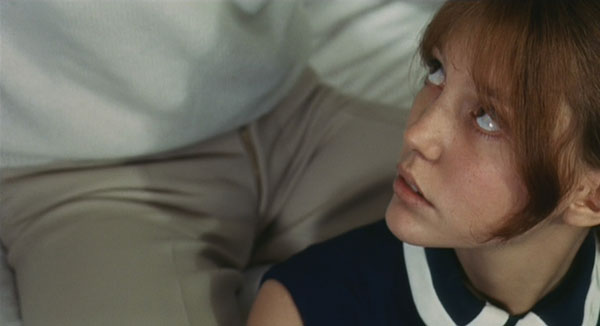“Terence Stamp has drolly recalled being over the moon when the Catholic church attacked Pier Paolo Pasolini‘s Teorema, in which he starred, on its release in 1968. ‘It was a very obscure movie—it was going to be seen by four drag queens and Einstein. And when the Pope came out against it, everybody wanted to see it.'” Demetrios Matheou at the Arts Desk: “Theorem, as it’s known in English, was indeed hugely successful. And it has since become one of the Italian’s best-known, most assiduously analyzed and arguably most influential films. One can feel its shadow over so many films featuring families driven to distraction by a seductive stranger; but in the Sixties, in the hands of a gay Marxist poet, this scenario received the definitive treatment.”
Theorem opens today in London as part of the BFI’s two-month-long Pasolini season, and the Guardian‘s Peter Bradshaw suggests that it “exists somewhere between the Golgotha and Sodom of his earlier and later movies. Terence Stamp is the beautiful antichrist ‘visitor’ to an upper-middle-class household in Milan who sexually entrances every single member: the son, the daughter, the maid, the mother and even the wealthy, ailing father, and then departs, leaving behind him a creative and destructive chaos comparable to the sort J.G. Ballard imagined in his Cocaine Nights. The daughter goes into a catatonic trance, the maid becomes a saint, the wife becomes sexually voracious and promiscuous, the son becomes an artist and cultural theorist (‘A sign succeeds by chance—it is fragile.’), and the father gives his factory away to the workers. It is as if Pasolini has imagined how Italy’s bland, complacent, stagnant governing class could be blown wide open: like putting a hundredweight of dynamite in the San Andreas fault.”
“Pasolini presents these transcendent upheavals with studious reserve, almost as if ideological transformation is best perceived in the unadorned language of biblical miracles,” notes Time Out‘s Trevor Johnston. “As a viewing experience, that makes it surprisingly low key. Yet the film’s conviction is truly defiant, its implications provocative across the board. A bonafide icon of ’60s world cinema.”
Back in the Guardian, John Patterson: “Not a conventional chronicle of bourgeois depravity like, say, Fassbinder’s Chinese Roulette, Theorem asks more troubling, cosmic questions: principally, does the enslaved mind crave liberation or does it fear and despise it?”
The BFI’s Geoff Andrew recalls being struck by his first viewing: “It wasn’t just that cast, including as it did Stamp, Anne Wiazemsky (fresh from Bresson’s Au hasard Balthazar, 1966, and Godard‘s La Chinoise and Weekend, both 1967) and the extraordinary Silvana Mangano; nor was it the often surprising but consistently evocative use of locations; nor Pasolini’s characteristically stimulating use of music (Mozart and Morricone). All these had their effect, but what felt most miraculous to me were the striking images Pasolini found to make his strange story so persuasive. Stamp seemed like some Apollo or Dionysus, and those falling under his spell appeared, very plausibly, to be utterly possessed. Even more than The Gospel According to Matthew, Theorem felt like a film which dealt–both seriously and semi-comically at the same time–with the spiritual and sensual, the physical and metaphysical.”
And Tony Rayns for the BFI: “The title suggests something quasi-scientific, but the fuel in Pasolini’s tank is satire, not algebra. Existential anguish was never more playful.”
Jonathan Rosenbaum in the Chicago Reader some time back: “Pasolini wrote a parallel novel of the same title, part of it in verse, while making this film; neither work is, strictly speaking, an adaptation of the other, but each deals with the same elements, and the stark poetry of both is like a triple-distilled version of Pasolini’s view of the world—a view in which Marxism, Christianity, and homosexuality are forced into mutual and scandalous confrontations. It’s an ‘impossible’ work: tragic, lyrical, outrageous, indigestible, deeply felt, and wholly sincere.”
For news and tips throughout the day every day, follow @KeyframeDaily on Twitter and/or the RSS feed. Get Keyframe Daily in your inbox by signing in at fandor.com/daily.




